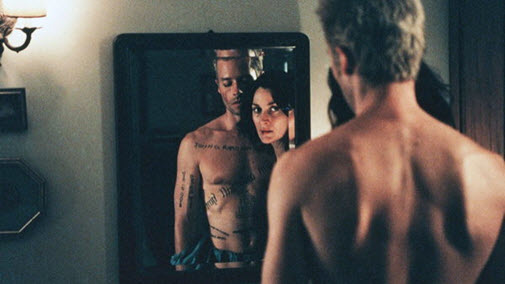When Memento arrived in 2001, it was a total buzzfest: Everyone was talking about it. It had a Wachowski level of cool (even co-starring Wachowski favorites Joe Pantoliano and Carrie-Anne Moss), it had a gritty noir sensibility, and an innovative time-bending structure deftly designed to get you inside the brain-damaged mind of Leonard Shelby (Guy Pearce). It left Sundance that January with the Waldo Salt Screenwriting Award, hit movie theaters in March, and when awards season came it was nominated for an Oscar for the Screenplay (Chris Nolan's first Oscar nomination) as well as the Editing prize. The movie has lost none of its cachet in the intervening years, retaining a 92% “fresh” rating on Rotten Tomatoes, and clocking in at #46 on the IMDb Top 250.
But I have a personal reason for loving this movie, as well as a story (I always have a story) if you'll indulge me after the jump...
In 1991, my ex, Isaac Bonewits, was diagnosed with a rare disease called EMS. We separated in 1998, but remained good friends, and saw each other often. EMS affects muscles, nerves, the immune system, and the brain, specifically the memory. My ex’s short-term memory was for shit; he could remember the scholarly material he’d studied over the years, but forgot everything he heard verbally, and couldn’t remember faces.
Memento is the story of Leonard, who cannot form new memories due to a brain injury sustained in the same violent crime that killed his wife. He is searching for his wife’s killer despite this profound disability. Like my ex, Leonard remembers almost everything by writing it down (unlike my ex, he also gets tattoos to create permanent mnemonics that he’ll see in the mirror).
In Memento I found something like a meditation on what it is to be, to love, to strive, to care, when you can’t remember. And I was moved in a way perhaps unique to someone touched by brain injury. Almost everyone loved the movie, but I loved it for reasons that were particular to me.
When my ex was buy to pick up or drop off the kid one afternoon, I mentioned this movie that I thought he’d love. We ended up having a pretty deep conversation about living with memory loss.
About six months later, Isaac went away for the weekend and visited with a mutual friend. When he got back, he stopped by the house and we sat and chatted about the visit. “By the way,” he said, “we saw the most amazing movie. You should watch it. I wrote down the name so I could remember to tell you about it.” Naturally, when he found the piece of paper in his pocket, it said “Memento”.
Isaac succeeded where Leonard failed; he retained an essential, recognizable, delightful self, despite his damaged brain. As Memento ends, we have no such confidence in Leonard, making the movie haunting and dark.
(Isaac Bonewits passed away on August 12, 2010.)

Deborah Lipp blogs about (mostly) television at Basket of Kisses.
